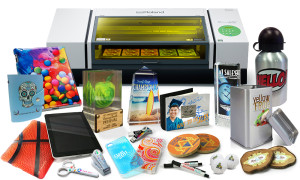Can We Print On Garment With UV Ink?
Let's talk a little bit about the two questions that everyone’s going to have. First one would be "Can I use it to print t-shirts?”

Can you? Maybe. Would I suggest it? No.
There's some talk that you can, and you don't need a pretreatment. While that may be true, it opens a whole other can of worms. The inks that are used in all UV printing, are fairly similar. The concern with UV inks is that they contain monomers, and monomers are what actually make it set. If those monomers are not fully set, you run the risk of people having skin irritation. And that's certainly something that;s a bigger concern with youth and children's shirts. You need a flexible UV ink. Generally flexible UV inks work well on items that flex, however they don't work well on items that don't flex. So if you buy a printer based on doing t-shirts, you've got to choose – do you want to do flexible or rigid? It's not something you're going to switch between. Swapping out inks is a major expense, a major time waste.
The other thing is that it doesn't look good on t-shirts, and certainly doesn't look good on cotton.
If you want to get a UV printer, it has to be kept in a ventilated area. This is not a back bedroom business. It's a big machine, and the UV ink smell affects people differently. If you're going to be working around it all day, especially if you're overly sensitive to smells, you need to make sure it’s ventilated.
The inks we use are relatively low VOC. Most flexible inks are very high VOC. They certainly need a specialized ventilation system. We had someone getting headaches and couldn't physically be in the room with the printer while we were trying to film stuff. Now with the lower VOC ink, they can be in the room for a few hours.

Can you? Maybe. Would I suggest it? No.
There's some talk that you can, and you don't need a pretreatment. While that may be true, it opens a whole other can of worms. The inks that are used in all UV printing, are fairly similar. The concern with UV inks is that they contain monomers, and monomers are what actually make it set. If those monomers are not fully set, you run the risk of people having skin irritation. And that's certainly something that;s a bigger concern with youth and children's shirts. You need a flexible UV ink. Generally flexible UV inks work well on items that flex, however they don't work well on items that don't flex. So if you buy a printer based on doing t-shirts, you've got to choose – do you want to do flexible or rigid? It's not something you're going to switch between. Swapping out inks is a major expense, a major time waste.
The other thing is that it doesn't look good on t-shirts, and certainly doesn't look good on cotton.
If you want to get a UV printer, it has to be kept in a ventilated area. This is not a back bedroom business. It's a big machine, and the UV ink smell affects people differently. If you're going to be working around it all day, especially if you're overly sensitive to smells, you need to make sure it’s ventilated.
The inks we use are relatively low VOC. Most flexible inks are very high VOC. They certainly need a specialized ventilation system. We had someone getting headaches and couldn't physically be in the room with the printer while we were trying to film stuff. Now with the lower VOC ink, they can be in the room for a few hours.
More info:
Website: www.skyimagepaper.com
Company Name: Fei Yue Digital Technology Co.,LTD
E-mail: sales@feiyuepaper.com
Tel: 86-025-86628894
Whatsapp: +86 18252072197
Address: Central Road 323, Nanjing, Jiangsu, China



评论
发表评论